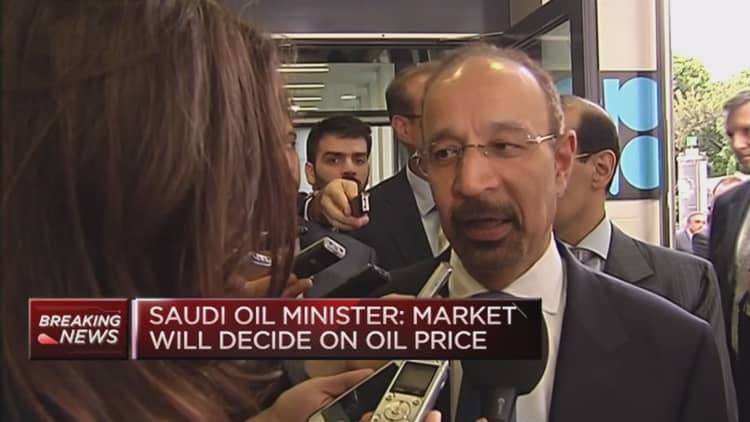


U.S. oil prices rose on Thursday after data showing a weekly drawdown in U.S. crude stockpiles helped crude markets recover from OPEC's decision not to set a ceiling for its production.
U.S. crude stockpiles fell 1.4 million barrels in the last week, the Energy Information Administration said. Although lower than a 2.5 million barrels forecast by analysts, the draw still helped crude futures erase early losses.
Gasoline stocks fell by 1.5 million barrels, while distillate fuel inventories were down 1.3 million barrels, EIA said. U.S. crude production also continued to tick down, according to EIA's preliminary weekly data.
International Brent crude oil futures were up 22 cents at $49.94 per barrel. U.S. West Texas Intermediate (WTI) crude settled 16 cents higher, or 0.3 percent, at $49.17 a barrel.
Futures had fallen more than 1 percent on Thursday as the Organization of the Petroleum Exporting Countries ended a recent meeting without setting a ceiling for its production.
Market participants had followed OPEC's gathering in Vienna for signs of agreement on reviving the group's collective output quota proposed by Saudi Arabia or the introduction of individual member country quotas suggested by Iran.
But the Organization of the Petroleum Exporting Countries failed to agree on these, with Saudi Arabia, its dominant voice, saying any "artificial ceiling" would be premature.
Still, Saudi Arabia promised not to flood the market with extra oil, suggesting a softening of its previous stance where it rigorously pumped to defend its share of a market oversupplied by an estimated 1.5 to 2 million barrels per day.
Saudi energy minister Khalid al-Falih told CNBC he believes the oil market is in good shape.
"The market is balancing. Trends are all good in terms of supply and demand. Prices have recovered somewhat and I believe they will continue to recover," he said.
Iran's Oil Minister Bijan Zanganeh, who came to Vienna vowing not to concede any exports until its crude shipments reached pre-sanction levels, said he was generally happy with the outcome of the meeting. He also said he saw no signs that other member countries wanted to boost output steeply.
Some traders said crude prices were partly pressured by the dollar's recovery following comments by European Central Bank President Mario Draghi that were considered bearish for the euro.
Despite rising output by OPEC's Middle Eastern producers, the group's overall production has remained largely flat this year, currently standing at 32.5 million barrels per day (bpd), capped by disruptions especially in Nigeria, Libya and Venezuela.
Citi said it expected oil prices to rise above $50 per barrel "in the near future" as attacks on oil infrastructure in Nigeria, power outages and payment issues in Venezuela and chaos in Libya have reined in total OPEC production even as Iran has ramped up harder and faster than expected.
Because of supply disruptions elsewhere, the Middle East's low cost producers see little reason to restrain output as overall market conditions have improved significantly for them this year.
"Since January 20, oil prices have almost doubled from near $26 per barrel to almost $50 per barrel, at the same time total OPEC production has increased by around 100,000 bpd, despite heavy outages in Nigeria," BMI Research said.
"This indicates the strategy championed by Saudi Arabia... to let the oil market balance without intervening, is gradually playing out," it added.



